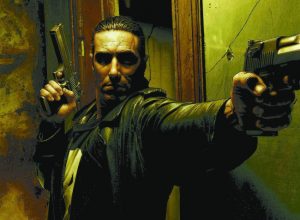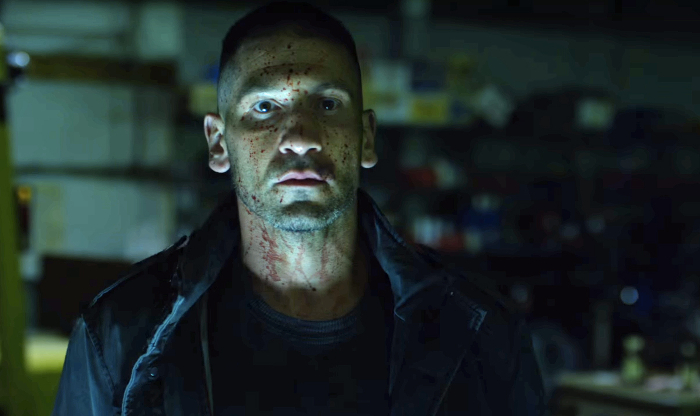As the second season of Daredevil, the Netflix adaptation of the hit Marvel Comics character, was released, Jon Bernthal, who plays Frank Castle, the Punisher, said to press that his character is “hard to like” in the series and also that he hoped the show would cause people to “rethink the role of guns in society.”
He succeeded in the latter. Firearms are not portrayed with the lack of fatal realism seen in classic American cinema or the cartoonish destruction of a Quentin Tarantino movie. They are portrayed in reality. Throughout the series, Frank Castle shoots and kills various characters who, certainly, were bad guys but the reality is hard to forget and done with what seems like intention.
The former, however, is another matter. While the character of Frank Castle does terribly unlikeable things – including shooting the protagonist of the show in the head, something Matt Murdock (Daredevil’s alter ego, played by Charlie Cox) only survived because he was wearing an armored mask, Bernthal’s Punisher is extremely likeable and sympathetic.
This is the major shift in portrayal of the character. A successful Punisher seems like a no brainer. America withstands its nonsensical and destructive firearms laws because of a mythology that seems perfectly in line with the Punisher. Frank Castle’s family was murdered by criminals wielding weapons, which wasn’t stopped due to a corrupt government that helped set up the event in the first place, and the only justice he is able to bring is by wielding weapons himself. The Punisher seems perfectly in line with our country’s ideology regarding weapons.

Despite his simplistic basis and appeal, Marvel had a lot of bad luck portraying The Punisher in film. 1989’s Punisher was one of the first attempts Marvel made at film (Marvel seemed, before the 2000s, to be more comfortable trying to sell “gritty” characters like the Punisher or Blade for adaptation).
After that, three Punisher films were made — 2004’s The Punisher, 2008’s War Zone, and 2012’s Dirty Laundry. I haven’t seen the last one, which stars Thomas Jane. The Jane movies weren’t bad, but they didn’t have a critical component that Bernthal does bring to the role – humanity. Jane’s Punisher seemed like a fan boy romp – complete with cool and entertaining fight scenes, but like the Ben Affleck Daredevil, ultimately shallow and unbelievable.
Bernthal’s Punisher is painfully likeable – so much so, that his portrayal of Frank Castle seems to break our heart through the entire second season. There are several points of his portrayal in which he seems all too tragically empathetic – one being an episode in which he takes control after being tortured by Irish mobsters. With a gun aimed directly at his face, Frank asks who ordered the hit on his family, to which the mobster says, “Your family? Who cares?” The writing is simply fantastic — we are made to see the sort of nihilism that laid waste to Castle’s family and the means that Castle has taken up as the logical answer to it. In addition, Bernthal’s boyish look is a star contrast to the bodybuilder look of Thomas Jane, playing more to Frank Castle’s appeal to the audience as a reluctant vigilante.
 Karen Page (Deborah Ann Woll), one of the main protagonists, cannot help but empathize with Castle. An intern for Nelson and Murdock, the law firm of Daredevil’s alter ego, she finds herself involved in nearly all of the many conflicts of the series. In a heated debate with Matt Murdock, Karen Page awkwardly declares that Castle’s methods “work,” while Page defends Castle vehemently, even as he tells her to “get away from me.” One of the most powerful scenes comes after a testimony in his trial, in which Nelson and Murdock defend Castle. While focusing on the trauma that made Castle in to the Punisher, a teenager stands up and yells, “You killed my dad! I don’t care what you’ve been through!” Castle asks Page “I did that? I killed his dad.” Page replies, “You’re not a monster” to which Castle says, “Are you sure about that?”
Karen Page (Deborah Ann Woll), one of the main protagonists, cannot help but empathize with Castle. An intern for Nelson and Murdock, the law firm of Daredevil’s alter ego, she finds herself involved in nearly all of the many conflicts of the series. In a heated debate with Matt Murdock, Karen Page awkwardly declares that Castle’s methods “work,” while Page defends Castle vehemently, even as he tells her to “get away from me.” One of the most powerful scenes comes after a testimony in his trial, in which Nelson and Murdock defend Castle. While focusing on the trauma that made Castle in to the Punisher, a teenager stands up and yells, “You killed my dad! I don’t care what you’ve been through!” Castle asks Page “I did that? I killed his dad.” Page replies, “You’re not a monster” to which Castle says, “Are you sure about that?”
For all its heated violence, Daredevil has to be commended for not descending in to cheap sex. The romance seen in the series is surprisingly mature, with the characters engaging in complex, interconnected relationships that are built on empathy instead of physical attraction. Love is a real thing in Daredevil’s world and that of Punisher as well and their love is something that goes to war with hate. We never see Karen, as pretty as actress Deborah Ann Woll is, strip naked, make out or sleep with any of the characters – the most physical she gets on camera is holding Matt Murdock’s hand. Nevertheless the relationships she develops with both Daredevil and the Punisher are engrossing and powerful.
The success of Bernthal’s portrayal of the Punisher has led to Netflix ordering a season surrounding the character. Not to spoil anything but the end of the second season presented the Punisher as a hero all his own, set for a series of his own. After numerous tries, the harshest of superheroes may have finally found his calling.


I would agree this run of the Punisher in Daredevil was pretty good. The problem with the character is, as one of the first mainstream anti-heroes, too much humanity is injected. When Castle’s family is killed, he dies with them. He resorts to war because war is what he knows. He becomes consumed with his war and sees little outside of it. Writers struggle writing this character because they think the audience needs to both like and understand him. We understand tunnel-vision, grief, loss and revenge. In that respect, Ray Stevenson’s Punisher was the best portrayal. The movie wasn’t the best, but the character was closer to what made the comic so successful. If a really successful on-screen adaptation is to occur, less dialogue needs to be written and a freakishly large actor needs the role (like John Cena-sized). Castle is a monster. He needs to be treated more like a villian than hero. Of course, they’ll probably just keep rehashing tropes that haven’t worked and hope that the incarnation makes money before they reboot again instead of reading the source material.